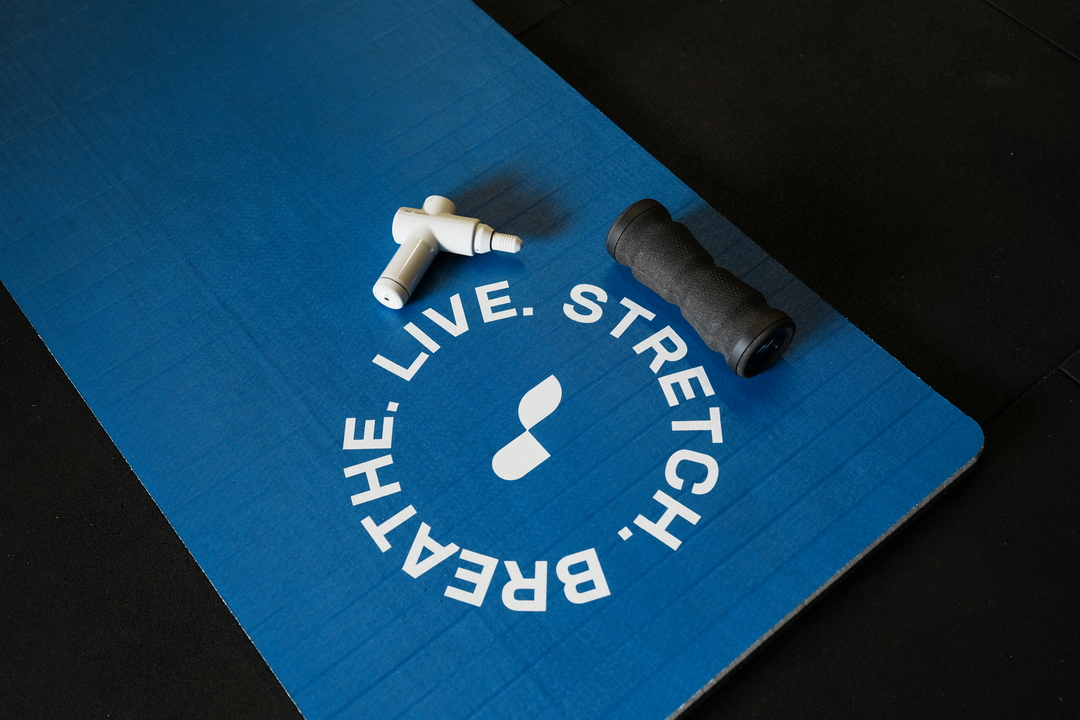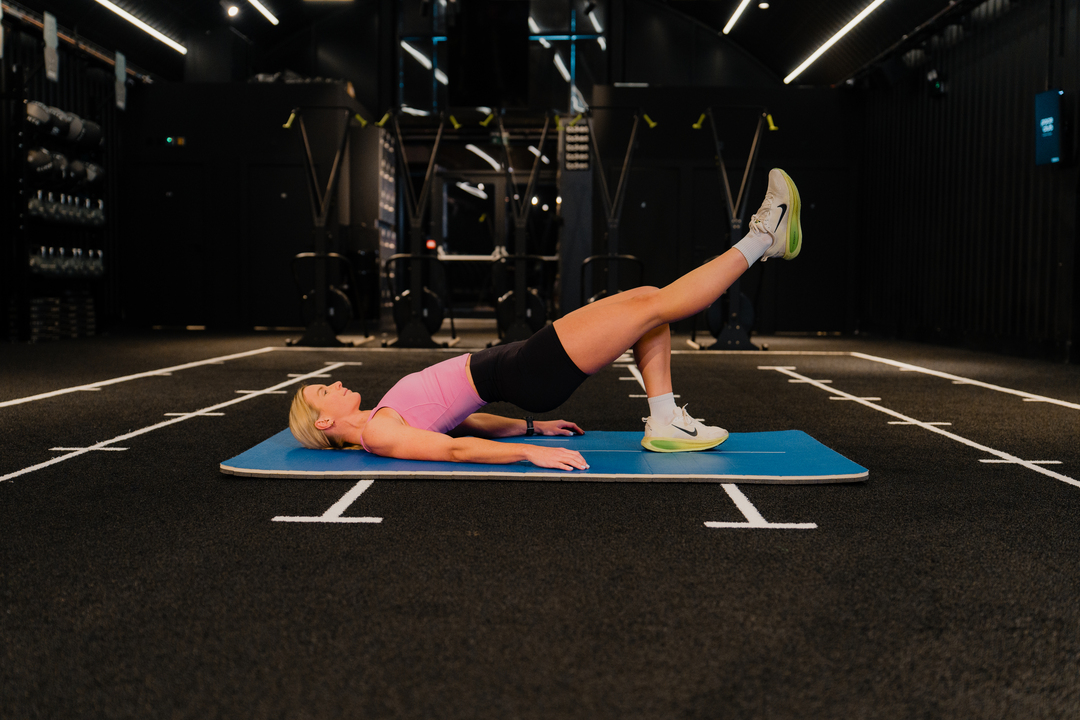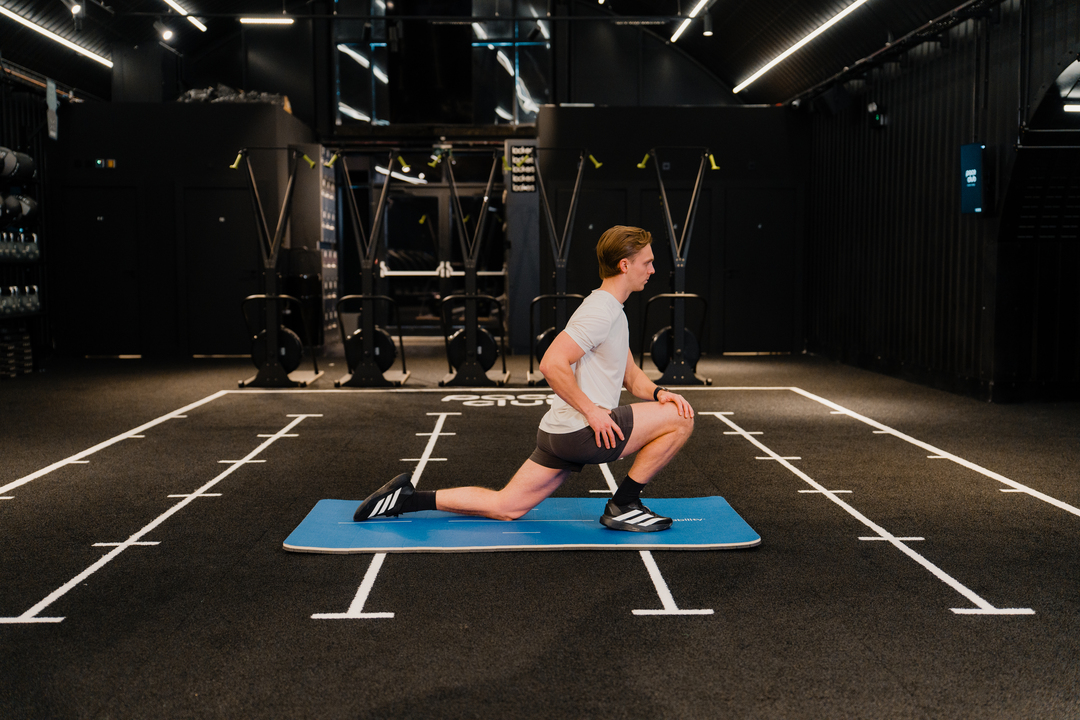Some days, lifting weights feels great. Other days, it feels like an uphill battle. Why do weights feel heavier some days? This common query among lifters illustrates the unpredictable nature of weight training. Understanding why we have off days and what we can do about them can help us lift consistently and confidently, even when it feels tough. This article examines the reasons behind your off days, How to warm up before lifting and provides strategies to help you overcome them.
Pliability's mobility app can help you improve your recovery, boost your performance, and get back on track for your next lifting session.
Why Do Weights Feel Heavier Some Days?

Carbohydrates, in the form of glycogen stored in your muscles and liver, are the fuel sources your muscles prefer to use for strenuous activity. Your muscles and liver can only store so much glycogen, so you have to keep replenishing it through diet.
If you don’t replace muscle glycogen stores after a workout, and in the time between workouts, you may enter a workout with glycogen-depleted muscles. As you might expect, this can impact your performance. When you have a day when you don’t feel as strong as usual, take a closer look at your diet.
Optimizing Carbohydrate Intake for Performance
If you follow a low-carbohydrate diet, your performance can suffer since you’re not optimizing your muscle glycogen stores. If you follow a very low-carb diet long term, you may also experience other problems that affect your training, like increased cortisol.
Cortisol leads to muscle breakdown, a reduction in thyroid function, and a decrease in the production of anabolic hormones, such as testosterone.
Of course, this doesn’t mean you should load up on high-glycemic carbs to keep your glycogen stores full. Eat more fiber-rich, whole food carb sources like sweet potatoes, moderate amounts of whole grains, fruits, and vegetables to enhance your performance, and be sure to eat a post-workout carbohydrate and protein snack in a 3:1 ratio to rebuild your glycogen stores after an intense workout.
Lack of Progression: Stagnation Can Make Weights Feel Heavier
If you’re not progressively increasing the weight you lift over time, your muscles may not be adapting and growing as they should. This can lead to a feeling of stagnation and weights that once felt manageable might now feel heavier due to a lack of strength improvement.
Central Nervous System Fatigue: The Brain’s Role in Strength Training
Your central nervous system (CNS) plays a significant role in coordinating muscle contractions. Intense or frequent training can lead to central nervous system (CNS) fatigue, reducing the efficiency of signals sent to your muscles. This fatigue can make weights feel heavier, as your muscles don’t receive the optimal neural drive.
Muscle Fiber Recruitment: Why Some Lifts Feel Heavier Than They Should
Lifting heavier weights requires recruiting a larger number of muscle fibers. Suppose you’re attempting a weight that demands more muscle fiber activation than you’re accustomed to. In that case, it can make the lift feel significantly heavier, especially if those muscle fibers aren’t regularly engaged.
Neuromuscular Adaptations: Give Your Body Time to Adjust to New Loads
Your body adapts to lifting weights over time by becoming more efficient in recruiting muscles. When you suddenly increase the weight, your body might not have fully adapted to the new load, causing the weight to feel heavier until your neuromuscular system catches up.
Psychological Factors and Expectations: Your Mind May Be Working Against You
Your mindset can significantly influence your perception of weight. If you approach a lift with doubt or expect the weight to be too heavy, your brain can amplify the perception of the load’s weight, making it feel heavier than it is.
Muscle Soreness and Recovery: You’re Not Fully Recovering Between Workouts
Exercise is a short-term (good) stress on your body. It’s what makes you stronger. But your body (and mind) also needs to recover after exercise, particularly when it’s intense or frequent. Your body is recovering for up to 24 hours later. Glycogen reserves are depleted after intense or long exercise sessions. (Glycogen depletion is associated with muscle fatigue.) Rebuilding glycogen reserves is a slow process, so it’s essential to add the right amount of carbohydrates in your diet and consume them regularly. In addition, some muscle protein is broken down, along with glycogen and fat, due to the stress placed on these tissues during exercise. This damage may continue for hours after the exercise session is over. Protein and amino acid supplements assist in muscle growth and are recommended to be consumed, along with carbohydrates.
Time of Day: Your Strength Varies Throughout the Day
If you train at different times of day, you may notice you’re stronger when you lift at certain times. It’s not your imagination. Your body temperature is higher in the afternoon than it is in the morning.
How Does This Impact Your Workout?
According to research, strength, flexibility, and power output are greater in the late afternoon when body temperature is higher. You may be able to lift a little more in the afternoon since you’re a little stronger and more flexible. Other research shows that muscle strength is lowest in the morning and gradually increases in the late afternoon or early evening.
Morning vs. Afternoon Training: Muscle Growth and Strength
Despite differences in body temperature, a study published in the Journal of Strength and Conditioning Research found that over 10 weeks, gains in muscle size in response to training were equal between groups that trained in the morning and those that taught in the afternoon.
You may be a little weaker if you train in the morning, but it probably won’t impact how much your muscles grow. Strength may be another story. The time of day and body temperature appear to primarily impact fast-twitch muscle fibers, which are best suited for strength and power.
Sleep: Insufficient Sleep Can Hurt Performance
How well did you sleep last night? The answer can impact your workout performance. A study published in the journal Ergonomics found insufficient sleep decreased performance on four key exercises:
- Leg press
- Dead lift
- Bench press
- Biceps curl
When participants lifted sub-maximally, although maximal biceps curl performance was not affected, it was notable that the participants slept only three hours for three consecutive nights, which represents a significant reduction in sleep. Getting less sleep than your body requires, usually between 7 and 8 hours a night, makes it harder to build strength and lean body mass in several ways. You release the most significant quantity of growth hormone during the deepest stages of sleep.
If you’re not sleeping enough, you’re probably not hitting those deeper stages for very long. If you consistently sleep less than you should, your cortisol level rises in response. As you know, cortisol boosts muscle breakdown, making it very hard to gain strength or size. Get your fitness, beauty sleep!
Hydration and Nutrition: Dehydration Can Impact Strength
Dehydration and inadequate nutrition can impact muscle function and energy levels. When your body isn’t properly fueled and hydrated, your muscles might struggle to contract effectively, making weights feel heavier than they would under optimal conditions.
Overtraining: Signs You May Be Doing Too Much
One of the cardinal signs of overreaching or overtraining is a decline in exercise performance, including a decrease in strength. If you’re training a lot and your performance is declining, you may not be giving your body enough recovery time. Keeping a training diary will help you identify when you’re pushing yourself too hard and when your performance is suffering.
Overtraining not only endangers your health by suppressing immune function, but it also makes it harder to reach your goals. When you overtrain, the stress hormone cortisol rises while anabolic hormones like testosterone drop. That’s not what you want.
Variability in Daily Performance: Performance Fluctuates from Day to Day
Numerous daily factors can influence your strength levels, including sleep quality, stress, and general fatigue. A lack of sleep, high stress levels, or just an off day can diminish your strength output, causing weights to feel heavier than on days when you’re well-rested and energized.
It’s Not Always You Who Got Weaker: Other Factors Can Impact Lifting Performance
In the world of fitness and weightlifting, it’s essential to recognize that changes in your lifting performance aren’t always solely indicative of a decrease in your strength. Various factors at play can influence how weights feel and how you perform during workouts. Here are some points to consider.
External Factors: The Environment Can Impact Your Lifting
The environment, temperature, humidity, and even the equipment you’re using can impact your lifting experience. If any of these factors change, it can affect how the weight feels, even if your strength hasn’t decreased.
Form and Technique: Poor Lifting Mechanics Can Make Weights Feel Heavier
Poor form or technique can make weights feel heavier. If you’re not lifting with proper mechanics, specific muscles might be overworked or underutilized, leading to a sensation of increased weight.
Temporary Setbacks: Life Can Get in the Way of Training
It’s natural to experience setbacks due to illness, injury, or life circumstances. These setbacks can impact your performance temporarily, but they don’t define your overall strength.
Related Reading
- How to Workout When Tired
- Stretching vs Warming Up
- What Are the Benefits Associated With Warming Up Before Exercise?
Techniques to Tackle the Feeling of Heaviness in Your Lifts
.jpeg)
Before starting your main lifts, engage in a thorough warm-up routine. This should include cardiovascular exercises to increase blood flow, dynamic stretches to improve flexibility, and lightweight sets to activate the muscles you’ll be using. A proper warm-up prepares your body for the upcoming work and can help alleviate the feeling of heaviness.
Progressive Overload: Lift Heavy to Lift Light
Gradually increase the weight you lift over time. Progressive overload challenges your muscles to adapt and grow stronger. This systematic approach prevents sudden weight fluctuations that could feel excessively heavy. Aim to add a small amount of weight or increase repetitions in each workout session.
Optimize Technique: Lifting Is a Skill
Focus on maintaining proper form and technique throughout your lifts. A well-executed movement pattern ensures that you’re engaging the right muscles efficiently. This not only prevents unnecessary strain but also ensures that you’re lifting the weight optimally, reducing the perception of heaviness.
Visualization and Positive Mindset: The Power of Your Thoughts
Visualize successfully lifting the weight before you do it. Adopt a positive mindset and approach each lift with confidence. Your mental state can influence your perception of heaviness. By envisioning success and staying positive, the weight might feel more manageable.
Controlled Breathing: Don’t Hold Your Breath
Practice controlled and deep breathing while lifting. Inhale before you start the lift and exhale during the exertion phase. Proper breathing provides your muscles with oxygen and stabilizes your core, making the lift more efficient and reducing the sensation of heaviness.
Focusing on Muscle Engagement: Connect to Your Lift
Concentrate on the muscles you’re working on during each lift. By actively engaging and contracting the targeted muscles, you can enhance your mind-muscle connection. This focused engagement can help you feel more in control and capable of handling the weight.
Rest and Recovery: Don’t Train Through Fatigue
Ensure you’re getting adequate sleep and allowing your muscles time to recover between workouts. Fatigue and insufficient recovery can contribute to the feeling of heaviness. Prioritize rest days, and quality sleep, and even consider incorporating techniques like foam rolling and stretching.
Hydration and Nutrition: Fuel the Machine
Stay well-hydrated and maintain proper nutrition. Dehydration can lead to decreased muscle function, making weights feel heavier. Consuming a balanced diet with adequate protein supports muscle recovery and strength development.
Varying Repetition Ranges: Change the Stimulus
Incorporate different repetition ranges into your training. Using higher repetitions with lighter weights or lower repetitions with heavier weights can provide a different stimulus and break through the feeling of heaviness.
Deload Weeks: Take a Planned Break
Periodically incorporate de-load weeks into your training plan. These are weeks where you reduce the weight and intensity of your lifts to give your body a chance to recover. Deload weeks can prevent overtraining and reduce the perception of heaviness.
Mindfulness and Meditation: Chill Out Before You Lift
Practicing mindfulness and meditation can help you manage stress and improve your focus. Being present in the moment during your lifts can help you better connect with your body and manage the feeling of heaviness.
Consult a Professional: Know When to Ask for Help
If the feeling of heaviness persists despite trying various techniques, consider seeking guidance from a fitness professional or a physical therapist. They can assess your technique, training plan, and overall health to provide personalized recommendations.
Related Reading
- Warmup Exercises for Seniors
- Stretches Before Running
- Warm Up Exercises Before Running
- Dynamic Warm Up for Athletes
Improve Your Flexibility with Our Mobility App Today | Get 7 Days for Free on Any Platform
Pliability offers a fresh take on yoga, tailored for performance-oriented individuals and athletes. Our app features a vast library of high-quality videos designed to improve flexibility, aid recovery, reduce pain, and enhance range of motion.
Pliability offers daily-updated, custom mobility programs for individuals seeking to optimize their health and fitness. It also includes a unique body-scanning feature to pinpoint mobility issues.
If you're feeling limited by pain or your ability to move, Pliability aims to complement your existing fitness routine and help you move more effectively.
Sign up today to get 7 days absolutely for free, on:
- iPhone
- iPad
- Android
- On our website
To improve flexibility, aid recovery, reduce pain, and enhance range of motion with our mobility app.
Related Reading








